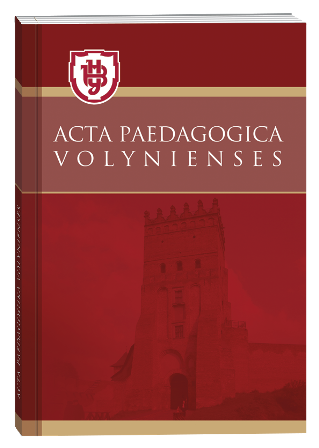SELF-REALIZATION AS A SELF-IDENTIFICATION. DESIGNING PERSONALITY BY MEANS OF LINGUISTIC STRATEGIES
DOI:
https://doi.org/10.32782/apv/2022.1.2.17Keywords:
self-realization, self-identification, creativity, producer, visual component, inspirationAbstract
It is difficult to overestimate the significance of the literary text in the development of text-working competence of University students of non-philological specialties in common, as well as specifically those who have the abilities for literary creativity. At the same time the potential of essay is powerful, self-realization as an act of self-identification, creativity through the prism of the word and the narrative aspect of the essay. The article presents and outlines the timelines of self-realization, creativity and self-identification of the relevant dominants in the verbal narration of-producer-creator student. Self-realization appears to be a creative signanta in the process of self-identification through the prism of verbal skills of acmeological narratives. The term “self-realization” must meet the clear definitions of the phenomena of “self-identification” through the prism of text strategies in the design and implementation of the student’s linguistic realities in creative aspects of receptive and productive philology, realization of own creative potentials through the facets of figurative aesthetics and verbal planes in the filigree image of the word. The act of self-realization is verbalized in creative consciousness and appears as creativity through the reflection of the poetic and prose statements of the innovator student. Creativity is a target skill in a modern society, it helps to realize and implement the potential of the word in the text narrative plane. Inspiration and realization of life experience through the prism of textual realities, the ability to combine ideas, knowledge of opportunities and acquired values determine the modern student of philology as a creative innovator through the prism of the word and its realities in text matter. Creativity is interpreted as human creative capabilities that can be presented in thinking, feelings, communication, separate activities, characterize the personality in general or its individual features. The thesis that creativity is the ability to do the work which is simultaneously innovative (that is, original, unexpected), and useful, that meets the requirements of our time, is indisputable.
References
Аристотель. Поэтика. Риторика. Санкт-Петербург, 2000. 348 с.
Богоявленская Д. О предмете и методе исследования творческих способностей. Психология мышления. 1995. № 5. Т. 16.
Воронцова Ж. Самореалізація особистості старшокласника у процесі диференційованої навчальної діяльності : дис. ... канд. пед. наук : 13.00.09. Харків, 2007. 243 с.
Гилфорд Дж. Три стороны интеллекта / под ред. А. Матюшкина. Москва : Прогресс, 1965. 534 c.
Дружинин В. Психология общих способностей : учебное пособие для бакалаврата, специалитета и магистратуры. Москва, 2019. 349 с.
Енциклопедія освіти / за ред. В. Кременя. Київ: Юрінком Інтер, 2008ю 1040 с.
Коростылева Л. Психология самореализации личности: затруднения в профессиональной сфере. Санкт-Петербург, 2005. 222 с.
Курочкина А. Исследования креативности: постановка проблемы экономики. Международная научная конференция, г. Санкт-Петербург, 19–20 мая 2009 г. Москва, 2009. С. 630–639.
Левченко Л. Творча самореалізація старшокласників у науково-дослідницькій діяльності шкіл нового типу : дис. ... канд. пед. наук : 13.00.01. Суми, 1999. 211 с.
Моляко В. Психологічна готовність до творчої праці. Київ, 1989. 36 с.
Мудрик А. Социaльная педагогика: yчебник. Mосква, 2007. 224 c.
Пономарев Я. Психология творчества. Москва : Наука, 1996. 304 с.
Професійна освіта : словник / уклад. С. Гончаренко та ін. ; за ред. Н. Ничкало. Київ : Вища школа, 2000. 380 с.
Психологічна енциклопедія / автор-упоряд. О. Степанов. Київ: Академвидав, 2006. 424 с.
Стернберг Р. Модель структуры интеллекта Гилфорда: структура без фундамента. Основные современные концепции творчества и одаренности. Москва : Молодая гвардия, 1976. 305 с.
Чхеайло І. Самореалізація особи (соціально-філософський аналіз) : дис. ... канд. філос. наук : 09.00.03. Харків, 2000. 181 с.
Lubart T. Children’s creative potential: an empirical study of measurement issues. Learning and Individual Differences. 2010. № 20. Р. 388–392.
Szmidt K.J. ABC kreatywności. Difin. 2010. P. 8–10.







